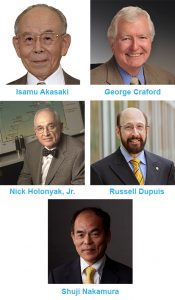Profs. Isamu Akasaki and Nick Holonyak Jr. honored for development of LED lighting
For Immediate Release
 Pennington, NJ – The Electrochemical Society (ECS) is proud to congratulate the 2021 Queen Elizabeth Prize for Engineering winners, Isamu Akasaki, Shuji Nakamura, Nick Holonyak, Jr., M. George Craford, and Russell Dupuis. The 2021 prize acknowledges their contributions from the initial creation and development of LED lighting its applications. The global impact of ubiquitous LED and solid state lighting has contributed tremendously to reducing energy consumption and addressing climate change. Akasaki, Nakamura, Holonyak, Jr., Craford, and Dupuis have interacted with The Electrochemical Society (ECS) throughout their careers, publishing much of their critical research in Society journals. Akasaki and Holonyak, Jr. are ECS Life Members.
Pennington, NJ – The Electrochemical Society (ECS) is proud to congratulate the 2021 Queen Elizabeth Prize for Engineering winners, Isamu Akasaki, Shuji Nakamura, Nick Holonyak, Jr., M. George Craford, and Russell Dupuis. The 2021 prize acknowledges their contributions from the initial creation and development of LED lighting its applications. The global impact of ubiquitous LED and solid state lighting has contributed tremendously to reducing energy consumption and addressing climate change. Akasaki, Nakamura, Holonyak, Jr., Craford, and Dupuis have interacted with The Electrochemical Society (ECS) throughout their careers, publishing much of their critical research in Society journals. Akasaki and Holonyak, Jr. are ECS Life Members.
 Nobel Laureate Isamu Akasaki has been an ECS member since 1985, receiving the Society’s Gordon E. Moore Medal for Outstanding Achievement in Solid State Science and Technology in 1999 and publishing multiple papers in the Society’s journals. He was awarded Life Membership in the Society in 2013. Fellow Nobel Laureate Shuji Nakamura delivered the ECS Plenary Lecture at the 218th ECS Meeting in 2010 where he reviewed the current the current status of III-nitride based light emitting diodes (LEDs) and laser diodes. Nick Holonyak, Jr. received the 1983 Gordon E. Moore Medal for Outstanding Achievement in Solid State Science and Technology. He was awarded Emeritus Membership in the Society in 1998. He is also known for mentoring the younger prize winners. M. George Craford received the ECS Electronics and Photonics Division Award in 1976. Former ECS member Russell Dupuis joined his fellow prize winners at ECS meetings.
Nobel Laureate Isamu Akasaki has been an ECS member since 1985, receiving the Society’s Gordon E. Moore Medal for Outstanding Achievement in Solid State Science and Technology in 1999 and publishing multiple papers in the Society’s journals. He was awarded Life Membership in the Society in 2013. Fellow Nobel Laureate Shuji Nakamura delivered the ECS Plenary Lecture at the 218th ECS Meeting in 2010 where he reviewed the current the current status of III-nitride based light emitting diodes (LEDs) and laser diodes. Nick Holonyak, Jr. received the 1983 Gordon E. Moore Medal for Outstanding Achievement in Solid State Science and Technology. He was awarded Emeritus Membership in the Society in 1998. He is also known for mentoring the younger prize winners. M. George Craford received the ECS Electronics and Photonics Division Award in 1976. Former ECS member Russell Dupuis joined his fellow prize winners at ECS meetings.
“The Electrochemical Society extends our most heartfelt thanks and congratulations to all the Queen Elizabeth Prize Engineering awardees. This is well-deserved recognition of their amazing contributions to science and society. We are especially honored to count Professor IsamuAkasaki and Professor Nick Holonyak Jr. as Life Members of the Society,” said Christopher Jannuzzi, Executive Director and Chief Executive Officer of The Electrochemical Society.
“I want to congratulate the scientists/engineers not just for being awardees of the prestigious Queen Elizabeth Prize, but definitely for their contribution to a sustainable society. The impact of LED has been an enlightening contribution,” said Stefan De Gendt, President of the ECS Board of Directors.
The Queen Elizabeth Prize celebrates engineering’s visionaries, encouraging engineers to help extend the boundaries of what is possible across all disciplines and applications. It also inspires young minds to consider engineering as a career choice and to help to solve the challenges of the future. Considered on par with the Nobel Prize, it is given to engineers who create world-changing technology. Previous winners include the engineers of the internet/web, GPS, controlled medication delivery, and digital imaging sensors. Prize winners receive £1 million.
The prize is administered by the Queen Elizabeth Prize for Engineering Foundation and funded by generous support from the following corporate donors: BAE Systems plc; BP plc; GlaxoSmithKline; Hitachi, Ltd.; Jaguar Land Rover; National Grid plc; Nissan Motor Corporation; Shell UK Ltd; Siemens UK; Sony; Tata Steel Europe; Tata Consultancy Services; and Toshiba.
Solid state lighting technology is everywhere from digital displays and computer screens to handheld laser pointers, automobile headlights, and traffic lights. Today’s high-performance LEDs are used in efficient solid state lighting products across the world and contribute to the sustainable development of world economies by reducing energy consumption. Visible LEDs are now a global industry predicted to be worth over $108 billion by 2025. Low cost, high efficiency LED lighting is 75 percent more energy efficient than traditional incandescent and compact fluorescent bulbs, and plays a crucial role in reducing carbon dioxide emissions. LED bulbs last 25 times longer than incandescent bulbs and their large-scale use reduces the energy demand required to cool buildings.
The Electrochemistry Society
ECS, a prestigious nonprofit professional society, has led the world in electrochemistry, solid state science and technology and allied subjects since 1902. By publishing research, hosting meetings, fostering education, and collaborating with other organizations, ECS advances scientific theory and practice. Our 8,000+ member community in 85+ countries develops innovative solutions to major global challenges. The ECS Digital Library, hosted on IOPscience, encompasses 160,000+ journal and magazine articles and meeting abstracts, and the Journal of The Electrochemical Society, the oldest peer-reviewed journal in its field. Scientists, engineers, and industry leaders share relevant scientific developments, network, and expand research horizons at ECS biannual, co-hosted, and sponsored meetings.
Learn more about the history of ECS at www.electrochem.org/history-ecs.
Media Contact
The Electrochemical Society
Shannon Reed
Director of Community Relations
609.737.1902, Ext. 107
Shannon.Reed@electrochem.org


